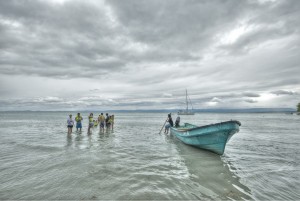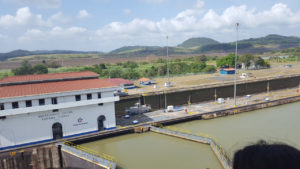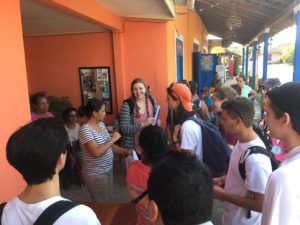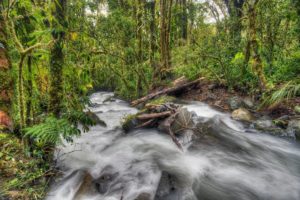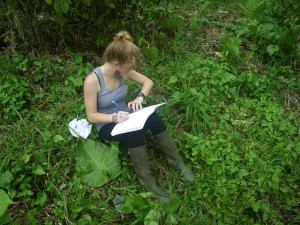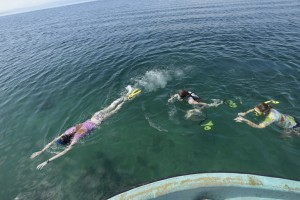2022 CSW Education Abroad Program to Panama
Thank you for your interest in the 2022 Education Abroad Program to Panama. 2022 will be the 14th time this Science, Language and Culture full module course will be offered at CSW. We are planning this current course in the context of COVID-19 and we’ll need to stay flexible in our arrangements. We are committed to providing a robust and safe interdisciplinary experience.
We do all of our planning directly with local Panama partners, providing us with greater flexibility, a richer and stronger connection with locals, better customization, and all the while reducing the overall cost of the course.
Panama is a fascinating and complex country. It has a rich geopolitical history with many distinct regions and high standards for public health. The Panama Canal is very important in Panama’s history. It’s an icon of engineering, and has long been of worldwide strategic and economic interest. There are also several indigenous groups and several large self-governing areas (comarcas) where indigenous peoples have much autonomy. Ecologically, we will visit lowland rain forests, cloud forests, tropical dry forests, coral reefs, and mangroves. The major sites we plan to visit are distinctly different and offer a great contrast in both ecology and culture. All the areas we visit are known as safe for travelers.
Credit: The course is interdisciplinary. We will cover science methods and ecosystems, as well as Spanish language and Panamanian history and culture, but the course itself is much broader. Some of the other topics we will cover include politics, social structure, economics, agriculture, food systems and development in Panama. For credit, students will receive 2 science credits, 1 language credit, and 1 athletic credit.
CSW staff leading the course:
- Patricio Hernandez: Patricio is a 6th-year Spanish Language teacher at CSW. He is the incoming chair of the CSW Languages Department. He is a native of Chile and lived much of his life in Venezuela. He has been a full-time Spanish Language teacher since 2004. Patricio was a co-leader of the 2017 and 2019 integrated courses in Panama, and he has worked with travel abroad programs in Spain.
- Steve Scrimshaw: Steve is a veteran teacher and has co-led all 13 full-module CSW student courses in the Neotropics. Steve has travelled extensively to Panama, Costa Rica, Guatemala and Belize. He is the founder of the Science and Language focused tropical field courses at CSW. He is a 30-year member of the CSW Science Department.
Panamanian staff joining our course:
- Mitzy Herrera: Mitzy will join our group as a leader. She is a life-long resident of Pedasí, Panama and she is currently living in Guararé, Panama. We’ve worked with Mitzy in 2013, 2015, and 2017 when she was a Spanish language teacher for our group in Pedasí. In 2019, she joined us as a fulltime leader for the entire course. She was great with our students, and she brings expertise, and fluency in both language and culture. Mitzy has B.A. in Education and a Master’s degree in Panamanian Folklore. She will stay with our group at all sites and will be part of all aspects of the course.
Once we’re in Panama, other local adult instructors, lecturers and guides—most of whom we’ve worked with before—will join us in assisting with the course.
Cost: There is an extra fee for this course,.Fees are all inclusive (airfare, meals, lodging, transportation, laundry, park entrance fees, etc.). It also includes the cost of extra staffing, excursions, and community service projects. The exact price of the course will be set once we know how many students are going, and we fine-tune the curriculum and determine the out-of-country time.
Financial aid is available for students at CSW currently receiving financial assistance. Tara Keppler is the CSW financial aid officer and all financial aid for the course should be processed through her. Contact Tara directly (tkeppler@csw.org) if you have questions.
Applications for the Panama course:
The application for the course can be found by clicking on Panama 2022 questionnaire/application. All students interested in the application must submit their applications by Monday, May 24, 2021. Please contact us if you have questions about this process. Students must be in 11th or 12th grade and must have competed Spanish 3A prior to module 5.
Basic Course Itinerary:
Below are brief descriptions of the major sites we plan on visiting, and a summary of activities at each site in the order in which we plan to visit them. We are currently planning to be in Panama for approximately 30 days. There is a wealth of information about the course, including a blog and many photos of past courses that you can access at http://www.cswoffcampus.net. We will update the site periodically and it will contain the most updated course information.
Panama City: (Orientation, urban Panama & Panama Canal)
Our current plans are to arrive, after our flight, in Casco Viejo, or “Old Panama.” This historic district is right on the ocean with good access to shopping centers and museums. While here, we plan to visit the Panama Canal, including the Canal Museum at the Miraflores Locks. If health and safety dictate, we may modify or eliminate our short stay in the city.
Guararé: ( language instruction, dry forest & Pacific Ocean)
Guararé is where we plan to largely concentrate on language and cultural immersion. Guararé is on the Azuero peninsula. The area has a pronounced dry season, and it will be dry at the time of our visit. Seasonal dry forests are the most endangered of all major tropical forests. The Azuero peninsula is largely rural and is culturally distinct from the rest of Panama. It is known for its cattle ranches, beaches, very friendly people, arts and crafts, and for hosting some major national festivals.
Students will stay at and they will get to know the culture and history of the area. We have a varied program of activities in the afternoons and weekends. In addition to immersion in Spanish Language and local culture, we will engage in some science-based field trips. Like many areas of Panama, there are multiple economic pressures on the town. We will critically examine and discuss issues regarding changes that have occurred in this area. Through the lenses of language, history, culture, economics, and science, we will explore agricultural, fishing and conservation practices, and their impact on locals.
Cerro Punta: (Cloud forest, agriculture & culture)
The area of Cerro Punta, (which includes the town of Guadalupe where we’ll stay) is in the province of Chiriquí. Climatically it is a montane wet ecosystem (cloud forest). It is a very important agricultural area in Panama and is sometimes referred to as the nation’s “bread basket.” Most of the produce in Panama comes from this small area. The volcanic soil is rich and easy to turn, the climate is more temperate than other parts of Panama and there is abundant rainfall throughout the year.
For the first two to three nights, we expect to coordinate with Los Quetzales EcoLodge and stay in well-appointed cabins set deep in the cloud forest at 7,000 feet of altitude. The forest at this site is incredibly beautiful; it has an almost mystical aura. Students will explore this forest and will be challenged to reflect, through hiking, journaling personal investigations, and projects, on its physical structure, ecosystem dynamics, and patterns of species diversity. It’s also a great place for contemplation and a wonderful space to process the course and the group experience. For more information about accommodations please visit the following website.
After our stay deep in the forest, we may move into the more settled area of Guadalupe, where we’ll engage more directly with the local agricultural community. Over time, we have gotten to know many of the small farmers in this area, and in each course we have expanded our cooperation with them. There are major issues in working this land; it is steep and subject to erosion, fertilizers and herbicides are in common use to maintain high yields, and there is increasing competition from large landowners and international companies. This, in turn, increases pressure on, and potential damage to, the environment. Students will learn to put agriculture into a larger context of environmental, cultural, economic and political issues.
Our current plans are to leave Cerro Punta by bus, descending down the Pacific slope to the coastal city of Davíd, the hot dry lowland capital of Chiriquí. Via another road, we will climb back up to the continental divide and back down the moist Atlantic slope to the Caribbean port town of Almirante. We’d then board boats to take us directly to the ITEC field station on an island in Bocas del Toro.
ITEC: (Lowland rainforest, coral reefs, independent projects & history/culture.
Institute for Tropical Ecology and Conservation (ITEC) field station is located on Isla Colón in the archipelago of Bocas del Toro on the Caribbean side of Panama. The field station itself is located on the other side of the island from the airport and can only be accessed by boat. We will stay in field station bunk rooms. While at ITEC, students learn and practice field research techniques for studying tropical ecology and develop substantial field projects with full analysis and write-ups. We encourage and support students to engage in a systematic, hands-on exploration of the environment. Major ecosystems at this site include lowland rainforests, tropical marine communities. (including coral reefs), mangrove and raffia palm swamps, caves and streams. Dr. Peter Lahanas, the Director of ITEC, will join us in running this section of the course.
In addition, the Bocas del Toro area has a rich confluence of cultures, traditions and languages. The field station itself is run in cooperation with a local Ngobe family. The region is also a major exporter of bananas, and the past influences of the United Fruit Company are still quite evident there. Please visit http://itec-edu.org/ for more information about this site.
Once we’ve completed our projects, we will take time to debrief. When we leave ITEC, we will travel by boat to the airport on the other side of the island and fly to Panama City via Air Panama. Our current plans are to stay again in the Casco Viejo area for 1 night. We will return to Boston from Tocumen International Airport in Panama City.
Passports and Waiver Forms: All course participants will need a current passport. Please make sure that your passport does not expire within six months of our return date to the U.S. or you will not be allowed out of the country. If you don’t have a passport, please apply for one before the beginning of the 2021-2022 school year.
Health Information: COVID-19: As of February 28, 2022, the Government of Panama requires proof of Covid vaccination (which includes a booster) for entry into the country. The locales where we spend the most time in Panama are lower population areas. In the case of the ITEC field Station, our group will be the only one there. All areas we visit have very high standards for public health. The specific areas we travel to have extremely low incidence of malaria but your physician may suggest a malaria prophylaxis. Please consult your physician about travel health needs specific to your health situation.
If you click on the Home tab you can scroll through blog entries and accompanying photos going back to 2013. This should give you a good sense of the course.

